
Kylie Frew ’24, a mechanical engineering alum who is now pursuing her PhD at Lehigh, has been awarded a prestigious fellowship grant from the National Science Foundation Graduate Research Fellowship Program (NSF GRFP).
The fellowship, which recognizes promising graduate students in STEM fields, will support Frew’s three-year research plan, where her goal is to create “digital twins,” or image-based models, of bones.
Frew’s research involves coding and a lot of finite elements to analyze. The “digital twin” of the bone is created from medical imaging using a specialized software, which is used in finite element analysis to replicate the traditional physical tests.
Frew says that her simulation design could be used to replicate tests that gather information on mechanical properties that could traditionally only be obtained from physical tests that destroy the bone. Re-creating the experiment virtually, Frew says, would reduce the costs of gathering data to determine the mechanical properties of a bone and would lessen the need for animal testing.
This data can help determine what kind of treatment types work best for healing certain types of bone fractures/injuries. Her research covers creating a reliable and robust test to be used by researchers, so the bones in the animal experiments can be used for other tests, such as histology.
Frew knew she wanted to pursue graduate studies since getting involved in research as an undergraduate student at Lehigh. She started her first-year in a materials science lab that primarily focused on using machine learning before joining the Dailey Ortho Lab and their work in computational biomechanics.
“Once I got involved in research I realized how much I liked the concept of working on something that had an open-ended question attached to it,” Frew says.
Frew is advised by Hannah Dailey, an associate professor and the director of graduate studies in the Department of Mechanical Engineering and Mechanics. Frew says that Dailey has been an influential mentor and has created opportunities for her to achieve her goals.
Both undergraduate seniors and more experienced graduate students who already have a master’s degree under their belt compete for the NSF GRFP. Frew credits Dailey’s guidance with helping her put forth a strong application.
“I don’t think I would’ve gotten the fellowship without her specifically because she really advocates for her students,” Frew says. “She knows I want to go into industry, so she is setting up internship opportunities in my graduate degree, and when I was working on my GRFP application, she was constantly advising me.”
—Andrea Palladino ’26 is a student writer for the P.C. Rossin College of Engineering and Applied Science
